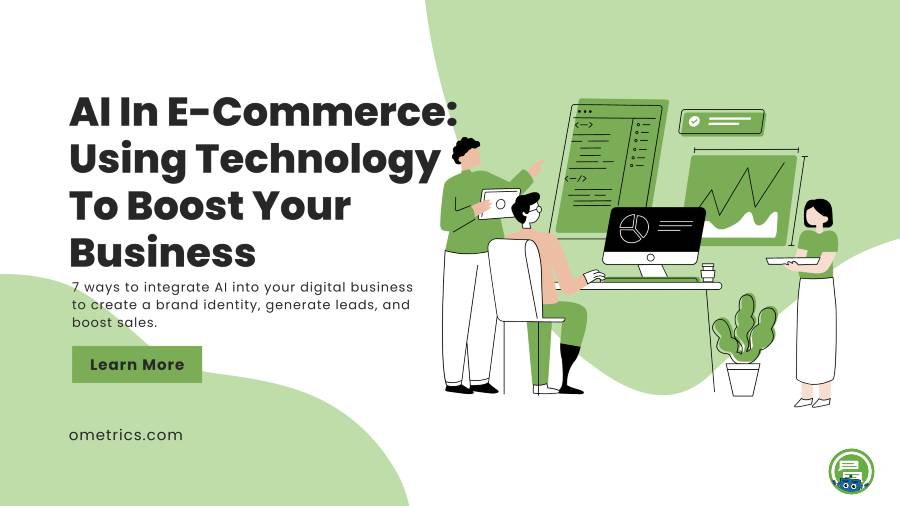Artificial intelligence (AI) has taken over the eCommerce sector by storm and for all good reasons. AI for businesses is not only providing personalized user experience but also contributing to website development, running marketing campaigns, organizing databases, and automating customer support.
A killer example of AI integration in eCommerce is product upselling and cross-selling that alone contributes to around 35% of the total business revenue. Moreover, 1 in 5 customers readily purchases via AI-powered chatbots. Online retailers are continuously adapting to AI tools to keep up with their competitors.
In this post we’ll thoroughly discuss the top AI technology options you can integrate into your digital business to create a brand identity, generate leads, and boost sales. We’ll also go through real-time eCommerce examples where AI is helping businesses grow.
Let’s get started.
How AI Is Revolutionizing Businesses In 2023?
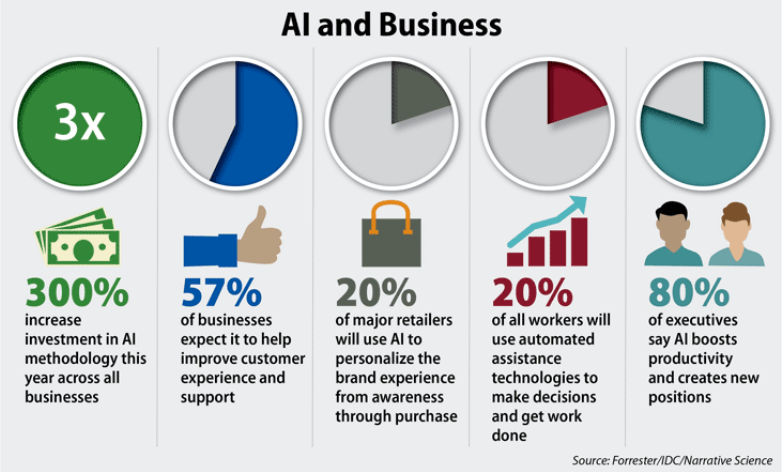
Artificial intelligence (AI) is an advanced form of computer software that can imitate human behavior like learning, problem-solving, data analysis, and planning. From self-driving cars to automated business predictions, and chatbots to Alexa voice shopping assistants, AI is everywhere around us.
AI coupled with machine learning, deep learning models, and natural language processing is taking digital technology and business to the next level. Self-driving cars are a popular example of AI in machine learning.
Autonomous cars use high-resolution cameras and sensors that annotate vehicles in a given set of images. The data gathered from images train the machine learning models to detect any obstacles including vehicles, pedestrians, road objects, etc, and react accordingly. This way the advanced machine-learning algorithm of driverless cars can prevent road accidents.
Here’s how AI is revolutionizing business in three ways:
-
-
- Automation of business processes
- Increase in customer engagements
- Offers insights and predictions through data analysis
-
A. Automation Of Business Processes
Process automation is one of the most commonly used applications of AI. It includes the automation of computers as well as physical tasks. It’s used in collecting, managing, storing, and evaluating data in business setups, especially in the administrative and financial sectors. For example, today we have AI tools to assess human behavior based on questionnaire surveys.
These tools are bringing a revolution in the human resource department by filtering out applications based on soft skills, cognitive skills, and professional competencies. It’s important to note that these AI-driven hiring tools cannot completely outpace human intervention, however, they make the hiring process faster and more effective with just the right amount of automation.
B. Increase In Customer Engagements
Advanced AI algorithms on consumer and employee engagements are getting popular in 2023 as seen in high-growth companies. While designing business strategies, retailers consider customer engagement as a crucial part as it drives more leads, sales, and conversions. Hence retailers are actively incorporating cognitive tools in businesses.
For example, AI chatbots come at the top for providing 24/7 assistance to customers mimicking real human representative behavior. Similarly, personalized online user experience as a part of AI cognitive projects has become possible due to the advances in AI. Online users are purposefully shown relevant content in response to increasing the chances of business sales.
C. Offers Insights And Predictions Through Data Analysis
Data analytics is another commonly used AI algorithm that works by finding patterns in a dataset and making evaluations and future predictions accordingly. It’s nearly impossible for humans to collect and analyze massive amounts of data in a digestible context without AI and machine learning algorithms.
For example, AI algorithms are used for fraud identification in the eCommerce and financial sectors. Suspicious transactions are not only identified but stopped altogether in real-time with the help of AI cognitive applications. Banking websites also send alerts to the affected customers via emails, messages, or applications if they detect any credit card misuse.
Similarly, personalized digital ad targeting, analyzing context for human insights, and offering relevant product recommendations to customers are great applications of artificial intelligence for business.
With all these benefits, let’s delve deeper into how AI improves your business.
7 Ways To Use AI For Boosting Your eCommerce Business
While there are several ways AI is used by individual companies in the eCommerce sector, we’ll focus on the top-priority ones that are directly linked to boosting sales and revenue.
1. Integrating AI-Powered Chatbots
Back then, businesses had to hire a big team of customer service representatives to cater to customer inquiries. Today, artificial intelligence has taken over the department of customer service for the majority of part, reducing tickets by up to 30%. Chatbots mimic human behavior while reducing human labor and provide automated replies to customers to help them choose the right products.
Advanced AI technologies like natural language processing (NLP) can help respond to complicated customer requests. Chatbots can also organize more serious customer requests into relevant categories that can be assigned to real human representatives to look after.
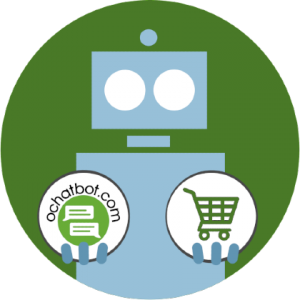
Generative and Scripted AI to engage shoppers in conversational eCommerce.
Create happy customers while growing your business!
-
1 out of 4 shoppers make a purchase on average*
-
5% to 35% Increase in AOV*
-
25% to 45% Reduction in Support Tickets
WE GUARANTEE RESULTS!
When you visit a website, you may notice chatbots giving the following customer services to engage customers:
-
-
- Providing product recommendations
- Giving reminders for abandoned carts
- Tracking a customer order upon request
- Greeting the customers whenever they land on a business website
- Presenting special offers, product bundles, and discounts to customers
- Helping in routing customers to a human representative for personalized requests
-
With the AI business models, now empathic chatbots are also getting popular as they can detect customer emotions. When a customer is happy, sad, dissatisfied, or angry, these chatbots handle them accordingly like a human representative. Chatbots can address customer requests using deeper artificial intelligence and machine learning insights.
One of our favorite examples is Zirtual, who’s incorporated chatbots in its UI/UX that assist buyers with queries relevant to its products and prices. With this chatbot they will be needing less manpower while keeping clients happy.
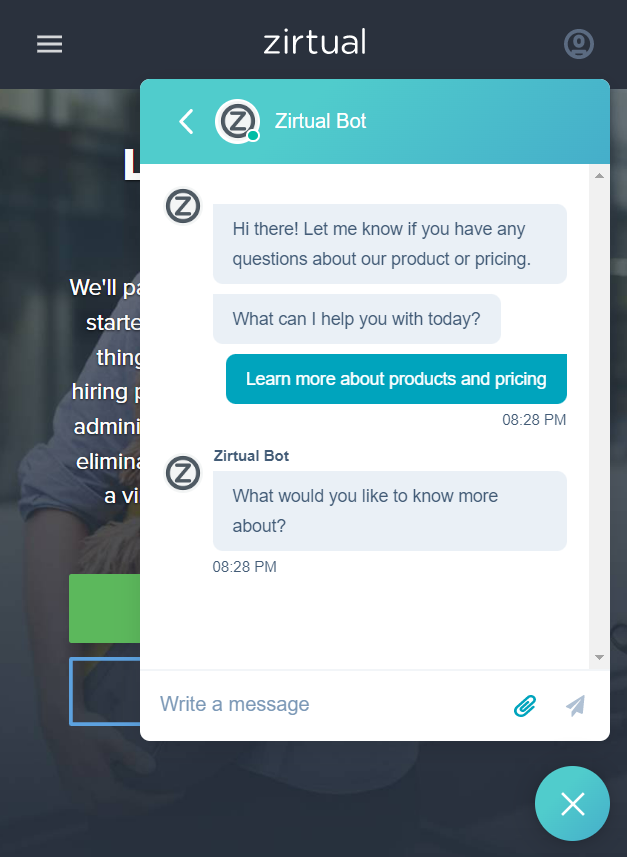
2. AI-Powered Personalized Product Recommendations
AI-powered tools capture real-time data of customers to provide them with a personalized shopping experience. They’ll recommend a wide range of the most relevant products and services to you based on your interests and requirements. AI tools detect customer behavior on a website in the following ways to recommend related products:
-
-
- Web pages visited
- Content engagement
- Frequent clicks on a particular title
- The product category you’re shopping in
- The amount of time spent on a product page
-
AI also keeps a track of insight into customer needs by gathering the following information:
-
-
- Browsing history
- Customer demographics
- Customer buying journey
-
To collect and store customer data for personalized marketing, embedded databases are leveraged using advanced machine learning algorithms.
For instance, take the AI example of shopping for Julbie’s footwear. A customer has chosen a pair of black heels and is just going through the checkout process. What happens is, AI instantly recommends all related shoes in the “you may also like” section. You may notice that all recommendations are based on the customer’s preference for shoes.
-
-
- Color: Black
- Type of shoes: Heels
- Texture: Shiny
-
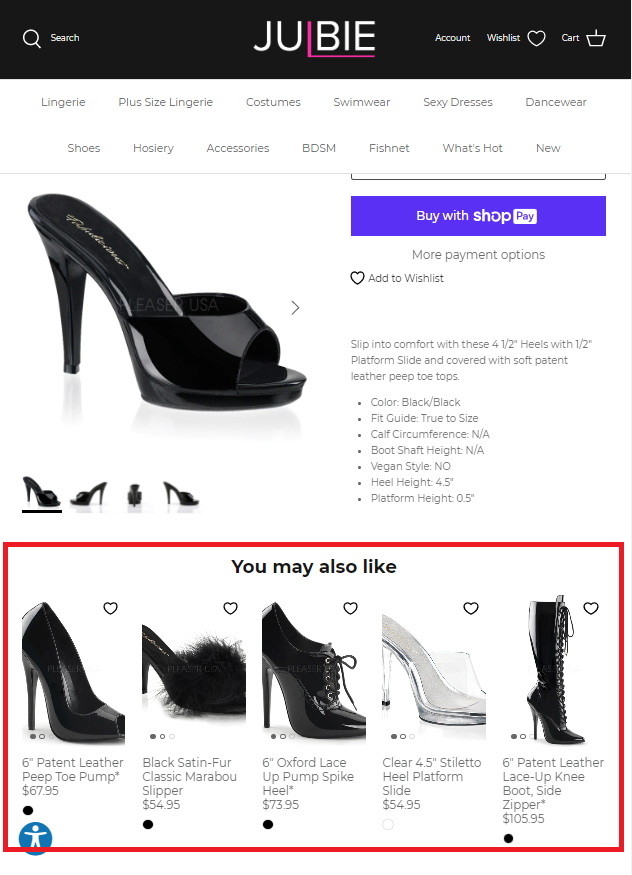
Expert Advice:
The timing of showing personalized product recommendations is equally important in driving sales. Most of the time, when a customer is ready to checkout and finds more relevant products shown as recommendations, chances are he ends up buying more products especially if he’s an impulsive buyer.
3. Increasing Customer Engagement With Popups
Customer engagement is crucial for building brand affinity which can ultimately lead to more sales. AI tools have revolutionized CTA’s by making them more relevant and targeted. Today, online businesses use CTAs in the form of popups to offer special discounts, offers, and product recommendations.
For example, this stock market website prompts users to sign in to use the website using a greeting popup. Such greeting popups that require a customer email help get user insights that will eventually give a personalized customer experience.

Popups are artificial intelligence tools that use triggers to offer specific CTA’s. The triggers depend on varied parameters including where a user is in the customer journey or the type of web page a customer is interacting at. Sometimes, customer information is collected through questions (Yes/No type popups) or customer surveys integrated into the website.
Following are a few engagement triggers to get your customers to take action at the right time.
-
-
- Exiting popups
- Sign-in popups
- Greeting popups
- Scroll down popups
- Page-targeted popups
- Cart abandonment popups
- Popups with special discounts
- Product recommendation popups
- Product upselling and cross-selling popups
-
One of our favorite examples is the less annoying sidebar popups a user encounters upon visiting Aloa, a software development service provider brand. Such popups appear on the side of the website and give users the authority to take action when needed. In this study case, the sidebar popups direct a user to sign up for accessing up-to-date tech news.

4. AR To Virtually Try On Products
Artificial intelligence (AI) combined with augmented (AR) reality offers a near-natural virtual shopping experience. Although there’s a massive difference between both concepts when merged result in unique software development having human intelligence.
The online home decor industry is actively using AR to allow online users to visualize how pieces of furniture may look in their homes before making a purchase. This eliminates the error of buying the wrong products that will not go with the color theme or the overall setup of the home.
Similarly, virtually trying on apparel, makeup, accessories, etc from an eCommerce business while sitting in the comfort of your home has become possible because of AI image recognition and AR. AR is directly linked to improving customer satisfaction.
For example, Nike is one of the pioneers in adopting artificial intelligence and augmented intelligence into their online as well as physical stores. Users can virtually try on shirts, pants, accessories, and shoes using the Nike augmented reality app.
One of the amazing features of the Nike AI app is that it determines the shoe size of a customer through a mobile camera scan. This saves time and effort on both sides while eliminating the hassle of returning requests in case of the wrong shoe size. The customer support department majorly benefits from such AI and AR features as it lessens customer requests.
Here are some of the leading eCommerce stores that use AI and AR to improve customer experience, and boost sales. You can take a look at these brands to get ideas about what features to implement for your website or app.
-
-
- Nike
- Zara
- IKEA
- Gucci
- Target
- Wayfair
- Amazon
- Sephora
- Warby Parker
- The Home Depot
-
5. Smart Searchandising Using AI
The website shoppers using the search option are high-intent buyers reportedly contributing to conversions at a 6 times higher rate than random website surfers. With the right use of business technology, customers can search and find products seamlessly. Current businesses are integrating artificial intelligence and machine learning practices to turn users into conversions.
Take the example of the AI-integrated smart search of this luxury hotel website. Serious buyers usually type in the exact products they’re searching for using the search tab. If a website has integrated AI and ML tools, it’ll extract user insights and show them more relevant products.

On the contrary, if a website doesn’t cater to user experience, the customer will most likely leave the website, leading to no business sales. Advanced AI integration with businesses can now provide the concept of “searchandising”. It combines unique merchandising practices with product search features. It assists with the following aspects of user experience:
- Faceted search
- Recent searches
- Recommended products
- Seamless website navigation
- Autocomplete search feature
6. AI-Powered Predictive Analytics
Intelligent applications are popular in forecasting future eCommerce outcomes based on the data collected for a certain period. Predictive analysis is especially important in the retail sector as it takes care of complex decision-making processes on the part of retailers.
Mathematical and statistical problem solving involving machine learning, artificial intelligence, and statistical models that assist in pointing out the pattern of occurrence of past events to predict the future. The following eCommerce supply chain areas benefit from AI-powered predictive analysis:
-
-
- Product demand
- Inventory management
- Product Price predictions
- Shipment price prediction
- Sales trends from previous years
- Prediction of product delivery time to customers
- Most popular products among a customer group
-
These insights help business owners to stock more products if future demand is predicted. The business issues of overstocking or unstocking get under control. Similarly, businesses can prepare beforehand in case of upcoming price elevations. Ultimately, the efficiency of the business process is maximized and so are the profits.
Besides the numerous applications in the supply chain, intelligence in business also plays its part in analyzing customer satisfaction with a brand. Advanced AI tools known as emotion AI or sentiment analysis works by gathering data from social media posts, customer story, client reviews, and brand ratings to evaluate how customers are perceiving their brand. This information is crucial for business improvement.
7. AI-Powered eCommerce SEO
SEO is the backbone of digital marketing for your eCommerce business. Adopting best SEO practices help in ranking your eCommerce store at the top few results of the SERP. Thus, bringing more traffic and sales to your store. However, the process of SEO optimizing an online store without AI tools can be time-consuming.
Thanks to the AI tools that help bring organic traffic to your business through the following ways:
-
-
- Keyword research
- Competitor analysis
- Measuring link value
- Enhancing topic authority
- Enhancing website authority
- Identification of keyword stuffing
- Using AI for original content writing
-
Some AI tools help in predicting the SEO ranking of your online shop ahead of time. This gives marketing professionals enough time to analyze, update, and adopt best SEO practices to improve future site SEO.
Conclusion
Artificial intelligence is revolutionizing business functions faster than ever and is expected to continuously grow and innovate in the coming years, creating more business opportunities worldwide. AI for business not only automates extensive, and time-consuming tasks but also enhances employee productivity and customer satisfaction.
Business leaders are using AI tools for accurate customer insights, higher user engagement, and boosting sales and overall revenue. Additionally, the power of AI and machine learning in detecting human errors, predicting future business trends, and eliminating fraudulent transactions makes it a star in business operations.
We’re listing the top 7 ways to use AI for boosting your eCommerce business as a quick recap:
- Integrating AI-Powered Chatbots
- AI-Powered Personalized Product Recommendations
- Increasing Customer interactions With Popups
- AR To Virtually Try On Products
- Smart Searchandising Using AI
- AI-Powered Predictive Analytics
- AI-Powered eCommerce SEO
Want to create a no-code AI chatbot to automate your customer service and enhance user engagement? Get your free Ochatbot and other Ometrics AI tools to streamline your eCommerce business.

Author Bio
Burkhard Berger is the founder of Novum™. He helps innovative B2B companies implement revenue-driven SEO strategies to scale their organic traffic to 1,000,000+ visitors per month. Curious about what your true traffic potential is?
- The Rise of Intelligent Websites - February 19, 2025
- Top Trending Products to Boost Your Shopify Store in 2024 - September 4, 2024
- AI Terms Glossary: Key AI Concepts You Should Know - August 22, 2024
